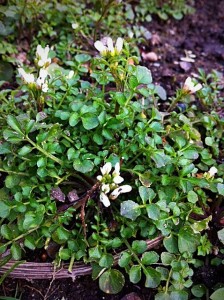Put on your safety glasses and get after that shotweed
Posted on February 24th, 2012 by Andy

Shotweed
By far, shotweed is one of the most annoying weeds in Seattle area landscapes. It’s a delicate annual broadleaf that shoots seemingly hundreds of seeds everywhere when you pull or disturb it. The weed also goes by little western bittercress, snapweed, bitterweed, or cardamine hirsuta. Whatever you call it, it’s a menace for Northwest gardeners. This annual weed is most prolific from fall through early spring, but its seeds, which live in soil for a long time, can germinate throughout the growing season. Shotweed loves the cooler gardens and landscapes of the Puget Sound.
Shotweed is part of the mustard family. Its seed pods are called siliques. The plants are small, no taller than about 5-8 inches. It grows pretty little white flowers, and isn’t a bad looking plant. But don’t be fooled. Shotweed can quickly become a huge nuisance in your garden if allowed to go to seed. Annual weed seeds persist in the soil for years and can grow when turned and exposed to light.
The best way to get rid of shotweed is to pull them by hand before they develop seed pods. Generally, annual weeds are easy to pull, especially in loose soil. As with most weeds, pulling them often and early is the best way to get rid of them. Also, make sure to mulch your beds with a thick layer of compost, bark or other mulch; eliminate bare soil by adding dense ground covers to your landscapes to keep out undesirables; and keep plants growing healthy so they can out-compete weeds. All those practices can help you improve your chances against annual weeds like shotweed.
A propane weed torch also can be an effective tool against shotweed, since you can instantly kill the plant without risking sending seeds flying everywhere. Please follow all safety precautions when using a weed torch, including having a fire extinguisher on hand and wearing proper gear. Weed torches work great for annual weeds, whose roots aren’t as deep or thick as, say, those of a dandelion. They’re also best for sidewalk cracks or gravel beds where you won’t run the risk of torching other plants.
Filed under:Seattle Landscape Maintenance | Permalink |
1 Comment (Go to comments form)
RSS feed for comments on this post · TrackBack URI




Posted by Lisa Stiffler
February 24, 2012 @ 3:23 pm
Ack! I have carpets of this crap. I wondered what it was called. Thanks, Andy!